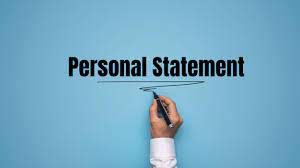To enter the university, or to enroll in a doctoral program, you will be asked for a “personal statement”, that is, a personal statement. This document will help you, among other things, to introduce yourself, describe your strengths and explain the reasons and motivations why you are applying to a training program or to a particular university.
The personal statement is an extraordinarily useful tool, and often underused by candidates. A well-written personal statement can give you a competitive edge over other candidates by speaking about you on a deeper level than just a professional one. That is its main characteristic, it is an element of self-promotion.
In this article we are going to review all the points that you must take into account to write your best personal statement to apply for admission to a University / Master’s or Doctorate program, so that your application does not go unnoticed
What is not a personal statement
To discover what a personal statement consists of, perhaps the easiest thing is to first know what it is not.
- A personal statement is not writing what the selection committee wants to read. That is too obvious and not honest.
- It is not about repeating all the data that you have already exposed in the CV, you should not duplicate information unnecessarily.
- On the other hand, although it is of course a professional document, it is not necessarily aseptic, it is important that you allow a glimpse of the person behind those written words. Because that is your purpose, that they know you.
And finally: what is a personal statement
A personal statement is a document attached to an application, in this case for a doctorate or university program in general, with the aim of serving as support when ordering the information and assessing your application from a more human point of view. , less cold”. It is important that your personal statement answers all these questions:
- Why, of all the programs, do I choose this one specifically, at this specific University?
- Why should the committee select me? What makes me special?
- How do my interests and experiences align with those of the program/University?
- What do I hope this program will contribute to my professional plan? What is that plan?
With your personal statement, you intend to let the committee know who you are, and how you fit into that program/university. You must be able to unequivocally convince them that you, and not someone else, are the ideal candidate. You have to make them as sure of it as you are, so you have to be very persuasive.
As we are seeing, it is an essay in which you have to answer very specific questions both for the person who applies and for the university/program. Each candidate must write their own, and must also write one for each application they submit. Everything must be personalized.
The personal statement comes from a period of reflection and self-knowledge: it is no use writing a few set phrases. You must take time to think about who you are, what goals you have as a professional and what are the steps to follow to achieve.
Key points for a strong personal statement
There are some important elements when writing your personal statement. We will review below those key points that reduce the strength of your document, and those that give it impact.
“weak” statements
- They include irrelevant data for the evaluation committee, or at least the candidate is not able to create the connection between himself, his personal history (values, experience, motivations) with the requested program/university.
- They use language that is excessively generic and poorly adapted to the particular candidacy. It is always important that each application indicates in some way where the application is being sent, since each case is different and has special characteristics.
- They are out of focus. It must be clearly reflected in the document that the experience/motivation/prior knowledge/interests/values are aligned with the key points of the program or the university. Otherwise, it is clear to the committee that a specific candidate will not integrate properly, nor will he share objectives with the rest of the people involved.
“strong” statements
- They perfectly connect the details provided by the candidate, that is, their experience/values/motivations, etc. With the program. This is very important to identify the best competitors, since the committee is convinced that the candidate has done an introspective exercise and knows where and what he is applying for.
- They talk about specific personal experiences and extrapolate them to provide valuable information, especially regarding difficult situations and the candidate’s ability to adapt and overcome some of these tests. They serve to explain the life path of the candidate, why he is where he is.
- They use confident, confident, and persuasive language.
- They have no spelling mistakes. This is something essential that needs little clarification
Tips for writing your own personal statement
We propose here a series of tips that will be very useful for you to prepare your own personal statement. In addition, it is important that you consider the key elements that we have previously mentioned for a strong personal statement.
Before you begin, you should know that writing a good personal statement takes time. So be patient and be prepared to write and rewrite several drafts before the final version.
- It is important that you do a self-discovery exercise, as well as a research exercise about the program/university: its values, its history, etc. That way you can get an idea of how to orient your text and connect both elements.
- Explain why you want to study that course, and how it will be useful for your future career development, what plan you would like to develop. In other words, what is your motivation. It is not necessary that you focus on this point since the objective is that you postulate yourself as the best and not so much your objectives, but that you mention it.
- Explain why you are suitable to enter that university/training. This is the point where your application and the University/education align, so it is very relevant. Do not repeat the data of your CV, that document has its own singularities and you must not be redundant.
- Mention why you make that request, what has inspired you to do it.
- It includes curricular and extracurricular experiences that may be of interest for training/university.
- Avoid clichés and do not give too many details or tell anything irrelevant.
- Use paragraphs of 3 to 5 lines, so that your text does not become heavy or boring for the evaluator. The approximate length is about 700 words, 1 or 2 pages.
- Ask your teachers to read it, talk to people who have been through the same process. The advice provided from experience turns out to be an extraordinary help.
- Finally, read what you have written and ask yourself: Am I telling you everything I can about my profile, abilities and strengths? What could I add to confirm my worth and my potential for this particular formation?



